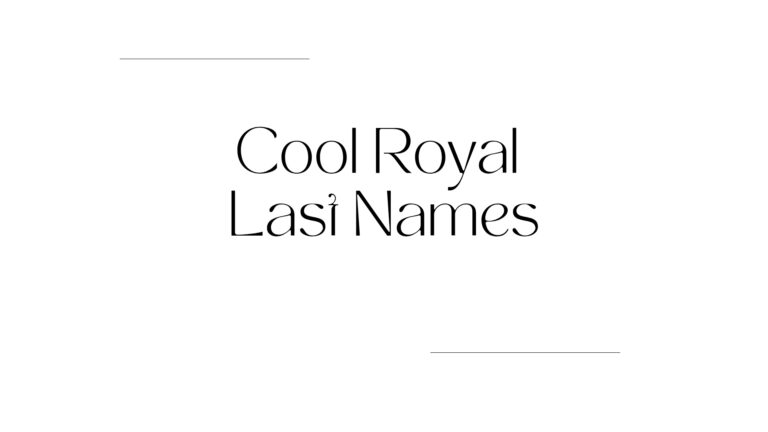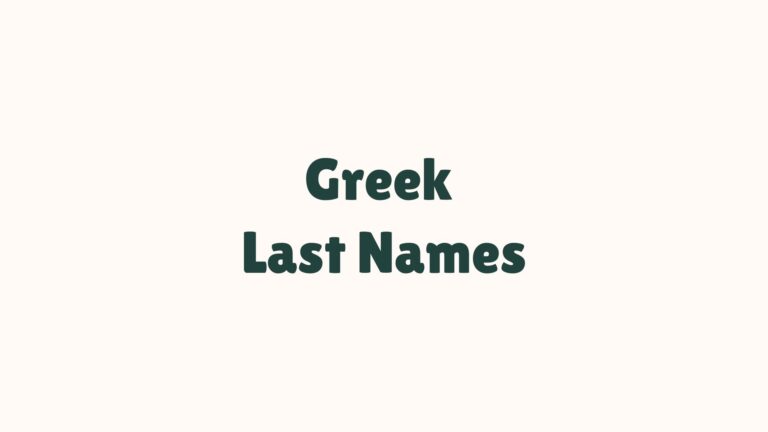100 Popular German Last Names
German surnames carry centuries of history, culture, and meaning. Stemmed from traditions ranging from occupations and geography to characteristics and familial ties, these surnames give one a peek into the lives and identities of those who bore them.
Names such as “Schmidt” (smith) and “Bauer” (farmer) show professions that were vital to society, while others, such as “Bergmann” (mountain man) and “Klein” (small), reflect personal traits or geographic origins.
Whether you’re researching your ancestry or are simply interested in the diverse tapestry of German nomenclature, this article will look into the meanings and stories behind some of the most common and unusual German surnames.
German Last Names
Schmidt – Means “smith,” typically referring to a blacksmith or metalworker.
Müller – Means “miller,” referring to someone who worked in a mill.
Schneider – Means “tailor,” referring to someone who made clothing.
Fischer – Means “fisher,” referring to someone who fished for a living.
Weber – Means “weaver,” referring to someone who wove fabric.
Bauer – Means “farmer,” a common surname for those working the land.
Hoffmann – Means “steward” or “farm manager,” originally someone who worked on a farm.
Wagner – Means “wagon maker” or “carter,” referring to someone who made or drove wagons.
Becker – Means “baker,” someone who baked bread or pastries.
Zimmermann – Means “carpenter,” a surname for someone who worked with wood.
Schulz – Refers to a “sheriff” or “village head,” originally a lawman or administrator.
Richter – Means “judge,” referring to someone who served in a judicial capacity.
Koch – Means “cook,” referring to someone who prepared food.
Lange – Means “long,” could refer to someone tall or a location near a long object.
Klein – Means “small,” typically referring to someone of short stature.
Meyer – Refers to a “tenant farmer” or “overseer” of a farm.
Vogel – Means “bird,” a surname possibly referring to someone with a connection to birds.
Neumann – Means “new man,” possibly referring to someone new to a community.
Schwarz – Means “black,” could refer to someone with dark hair or complexion.
Weiß – Means “white,” often referring to someone with fair hair or complexion.
Braun – Means “brown,” often referring to a person with brown hair or a darker complexion.
Lang – Means “long,” referring to someone tall or a geographical feature.
Fuchs – Means “fox,” possibly referring to a person known for their cunning or red hair.
Wolf – Means “wolf,” could refer to someone who was strong or brave like the wolf.
Bergmann – Means “mountain man,” referring to someone who lived or worked in the mountains.
Steiner – Means “stone” or “rock,” possibly referring to a stoneworker or someone living near a rocky area.
Schmitt – An alternative spelling of “Schmidt,” meaning “smith.”
Weber – Means “weaver,” indicating a profession in fabric weaving.
Günther – Derived from an Old High German name meaning “battle” or “war.”
Roth – Means “red,” likely referring to someone with red hair or a ruddy complexion.
Schuster – Means “shoemaker,” someone who made shoes.
Hahn – Means “rooster,” likely a name given to someone known for their leadership or boldness.
Hoffmann – Means “farmstead man” or “steward,” indicating a person managing farm operations.
Weidner – Means “forest dweller,” referring to someone who lived in or near a forest.
Weißmann – Means “white man,” possibly referring to someone with fair hair or skin.
Krause – Means “curly,” referring to someone with curly hair.
Schroeder – Means “tailor,” a person who made or repaired clothes.
Peters – A common patronymic surname derived from the given name “Peter.”
Schultz – Refers to the position of “village headman” or “sheriff.”
Heinrich – Derived from the personal name “Henry,” meaning “ruler of the home.”
Hensel – A diminutive of “Heinrich” or “Hans,” meaning “little Henry.”
Dieter – Derived from the old Germanic name “Dietrich,” meaning “ruler of the people.”
Sauer – Means “sour” or “acidic,” possibly referring to someone with a sharp demeanor.
Kramer – Means “shopkeeper,” someone who ran a small store or market.
Hofmann – Refers to someone who worked on a farm or estate.
Siegler – Derived from the word “Siege,” meaning “victory” or “victorious.”
Weinberg – Means “vineyard,” likely referring to someone who worked with or owned vineyards.
Bock – Means “goat,” possibly referring to someone with a stubborn or strong-willed personality.
Kraft – Means “strength,” referring to someone physically strong or powerful.
Sander – Derived from the Greek “Alexander,” meaning “defender of the people.”
Böhme – Refers to someone from Bohemia, a historical region in Central Europe.
Rosenberg – Means “rose mountain,” possibly referring to a rose-covered hill or a place named for roses.
Schnell – Means “fast” or “quick,” possibly referring to someone known for their speed.
Hoff – Means “court” or “farm,” referring to someone who worked or lived near a farm or estate.
Ziegler – Means “brickmaker,” referring to someone who made or worked with bricks.
Kühn – Means “bold” or “brave,” referring to someone with a courageous personality.
Götz – A diminutive of the name “Godfrey,” meaning “God’s peace.”
Vogel – Means “bird,” possibly referring to someone with bird-like qualities or characteristics.
Hartmann – Derived from “hart” (hard) and “mann” (man), meaning “strong man.”
Bauer – Means “farmer,” referring to someone who worked the land.
Schindler – Means “woodcutter” or “tree feller,” referring to someone who worked with wood.
Zimmer – Means “room” or “chamber,” often associated with someone who worked as a carpenter or builder.
Böhm – Refers to someone from Bohemia, an area in the Czech Republic.
Beck – Means “brook” or “stream,” referring to someone who lived near a waterway.
Löwe – Means “lion,” referring to someone known for strength, courage, or bravery.
Ziegler – Means “bricklayer,” someone involved in the construction of buildings using bricks.
Keller – Means “cellar,” possibly referring to someone who worked in a cellar or storeroom.
Schwarzer – Means “black,” could refer to someone with dark features or a dark personality.
Mayer – A variant of “Meyer,” meaning “tenant farmer” or “overseer.”
Stein – Means “stone,” referring to someone who worked with stone or lived near a rocky area.
Pfeiffer – Means “piper,” referring to someone who played a pipe or flute.
Schleicher – Means “lazy” or “slothful,” potentially referring to someone who was considered sluggish.
Kraft – Means “strength,” referring to someone who was strong or had physical power.
Meier – A variant of “Meyer,” meaning a tenant farmer or overseer.
Häuser – Means “house,” referring to someone who worked with buildings or was known for their home.
Gabler – A variant of “Gabriel,” a common first name meaning “God is my strength.”
Steffen – A diminutive of the name “Stephen,” meaning “crown” or “wreath.”
Scholl – Means “school” or “study,” likely referring to someone involved in education.
Graf – Means “count” or “nobleman,” referring to someone with a noble or high-ranking position.
Kraus – Means “curly” or “kinky,” likely referring to someone with curly hair.
Beringer – Likely derived from the personal name “Berengar,” meaning “bear-spear.”
Wolff – Means “wolf,” referring to someone with a strong or fierce personality.
Töpfer – Means “potter,” referring to someone who made pottery or worked with clay.
Kaiser – Means “emperor,” derived from the title for the ruler of the Holy Roman Empire.
Wüst – Means “desert” or “wilderness,” referring to someone from a barren or uncultivated area.
Linden – Refers to a “lime tree,” possibly indicating someone who lived near or worked with these trees.
Bach – Means “brook” or “stream,” referring to someone who lived near a small river.
Heilmann – Means “holy man” or “saint,” referring to a pious or revered individual.
Steinbach – Means “stone brook,” indicating a location near a brook with stones.
Rothschild – Means “red shield,” possibly referring to a heraldic symbol or a family crest.
Wagner – Means “wagon maker” or “cartwright,” referring to someone who made wagons or carts.
Voss – Means “fox,” referring to someone known for their cleverness or red hair.
Hoffmann – Refers to a “farmstead manager” or “overseer,” typically someone managing an estate.
Friedrich – Derived from the personal name “Frederick,” meaning “peaceful ruler.”
Gabler – Derived from the first name “Gabriel,” meaning “God’s strength.”
Künzel – Derived from “kun,” meaning “knowledge,” often associated with wisdom or learning.
Gärtner – Means “gardener,” referring to someone who worked with plants or owned a garden.
Bock – Means “goat,” possibly referring to someone with a strong or stubborn personality.
Merten – A variant of “Martin,” derived from the Roman name “Martinus,” meaning “of Mars.”
Bachmann – Means “man from the brook,” referring to someone who lived near a brook or small river.







